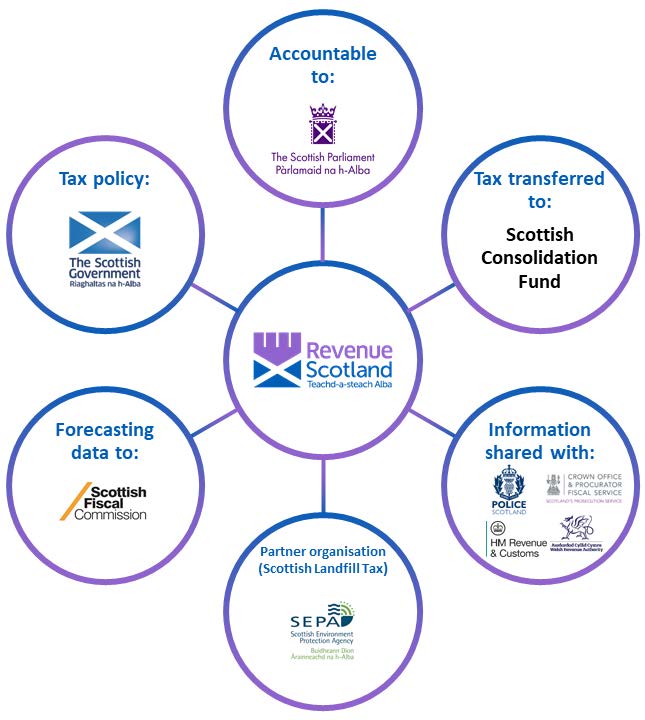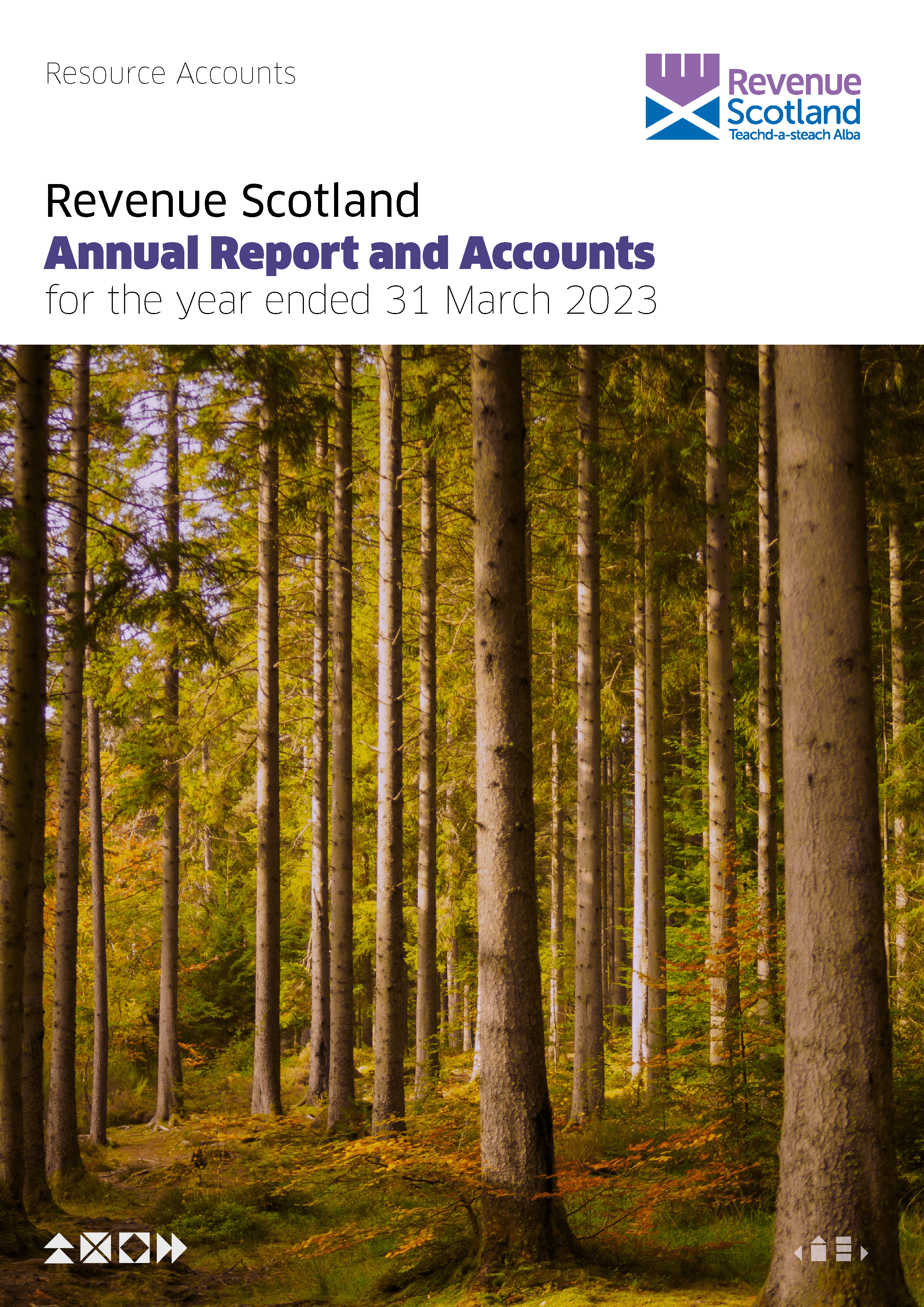Performance Report
Performance Overview
Introduction
This overview provides a concise summary of Revenue Scotland’s purpose and objectives, along with a detailed account of its budget and performance for the year. The report outlines the key risks that were identified and managed in the achievement of those objectives. In the Performance Analysis section, included in the report on page 29, there is a comprehensive elaboration on these topics
The performance report begins with a brief summary of our performance, followed by an in-depth analysis section that assesses our progress in relation to the strategic outcomes outlined in our Corporate Plan 2021-24.

Who we are and what we do
Revenue Scotland was established under the Revenue Scotland and Tax Powers Act 2014 (RSTPA). It is responsible for the collection and management of the fully devolved Scottish taxes: Land and Buildings Transaction Tax (LBTT) and Scottish Landfill Tax (SLfT).
As a non-ministerial office, Revenue Scotland is part of the Scottish Administration and is accountable directly to the Scottish Parliament, ensuring the impartial and fair administration of taxes. The Scottish Government is responsible for tax policy and rates, while Revenue Scotland provides policy development support through the provision of advice, data, and information based on its operational experience.
Revenue Scotland works alongside the Scottish Fiscal Commission (SFC), which is responsible for providing independent forecasts of tax revenue in line with the Fiscal Framework. To aid forecasting work, Revenue Scotland provides anonymous, aggregated SLfT and LBTT data to the SFC.
In addition to delegating specific functions for SLfT collection to the Scottish Environment Protection Agency (SEPA), Revenue Scotland also collaborates with His Majesty’s Revenue and Customs (HMRC) for compliance activity and participates in the British Isles Tax Authorities Forum, working closely with other tax authorities to share knowledge and best practices in tax collection and management.
How we are governed
The Board is responsible for the strategic direction, oversight, and governance of the organisation. It currently comprises seven members appointed by Scottish Ministers through the Scottish Public Appointments process. Board members provide specialist knowledge in key areas and act as ambassadors for the organisation. The Board has two committees: the Audit and Risk Committee (ARC) and the Staffing and Equalities Committee (SEC), which provide direction, support and detailed scrutiny of key areas of work and report on these to the Board. The Chief Executive is accountable to the Board and acts in a personal capacity as the Accountable Officer for Revenue Scotland. The Chief Executive is responsible for the day-to-day leadership and operation of the organisation. Further details about the activities of the Board, committees, and staff can be found in the Accountability Report section of the Annual Report.
How we are structured
The Senior Leadership Team is led by the Chief Executive and includes the Head of Tax, the Head of Corporate Functions, and the Head of Legal Services. These positions report directly to the Chief Executive and are responsible for the operational leadership, directing, and coordinating the delivery of Revenue Scotland’s strategic objectives. The organisational and team structure of Revenue Scotland is depicted in the diagram on the following page, providing a visual representation of the Senior Leadership Team’s role within the organisation.
How we are funded
Revenue Scotland is part of the Scottish Administration and its budget is set by the annual Budget Bill. The Scottish Government liaises with Revenue Scotland to identify its budgetary requirements which are then reflected in the Budget Bill that Ministers present to the Scottish Parliament. Where additional funding for major programmes is required, proposals for funding are developed in line with the guidance on business cases in HM Treasury’s ‘The Green Book: appraisal and evaluation in central government’. Revenue Scotland is responsible for managing its budget for each financial year to deliver its statutory functions. Revenue Scotland has authority to incur expenditure on individual items, but this is subject to the limits imposed by the budget allocated by the Scottish Parliament and guidance from Scottish Ministers.
Revenue Scotland’s purpose and vision
The Corporate Plan 2021-24 outlines our purpose, vision, strategic outcomes and performance measures. These determine our priorities to ensure we continue our work in raising revenue to support public services across Scotland in the most efficient and effective way.
Purpose
To efficiently and effectively collect and manage the devolved taxes which fund public services for the benefit of the people of Scotland.
Vision
We are a trusted and valued partner in the delivery of revenue services, informed by our data, digital by design, with a high-performing and engaged workforce.
Corporate Plan 2021-24 strategic outcomes
After eight successful years in operation, we have solidified our position as a leading and respected figure within Scotland’s tax and public sector landscapes.
Our Corporate Plan for 2021-24 is centred around four key strategic outcomes, as outlined below. These guide our efforts in achieving our strategic objectives, ensuring continued progress and adding value to the services we provide. Building on our impressive track record, which includes collecting nearly £6 billion in revenue since 2015, our plan charts the course for even greater success in the coming years.
Excelling in Delivery
We offer user-focused services that are digital by design, and provide value for money, convenience and ease of use for internal and external users.
Investing in our People
We are high-performing, outward looking and diverse, and provide a great place to work as an employer of choice. Our staff are motivated and engaged, and we invest in their development and health, safety and wellbeing.
Reaching Out
We are accessible, collaborative and transparent, keen to learn from others and to share our experiences and expertise.
Looking Ahead
We plan and deliver change and new responsibilities flexibly, on time and within budget. We have a digital mindset, maximising the use of our data and harnessing new technology to improve our working practices and services.
How we deliver our purpose and measure our success
Our purpose is delivered through the strategic outcomes outlined in the Corporate Plan. Performance is rigorously measured through the use of key performance indicators (KPIs) as set out in the Plan, and against the delivery of milestones related to the objectives of key projects. Our organisation has a Business Plan outlining projects and cross-cutting pieces of work which facilitate the achievement of strategic outcomes in the Corporate Plan, while also informing team plans and personal work objectives. This structure creates a clear line of sight between the work objectives of each staff member and the strategic outcomes set out in the Corporate Plan. Our structured approach to performance management supports how the organisation monitors and records progress across the business.
National Performance Framework
The National Performance Framework (NPF) serves as the cornerstone for the Scottish Government’s overall purpose and vision for Scotland, outlining National Outcomes to gauge progress towards achieving its broad goals. Our Corporate Plan 2021-24 aligns with and prominently features these National Outcomes, strategically directing and prioritising all organisational efforts towards realising those relevant to Revenue Scotland’s remit.
To ensure successful delivery of the Corporate Plan, we define objectives and deliverables. These are translated into action through a comprehensive strategic framework of corporate strategies, business plans, and team plans. We have robust performance reporting processes in place, monitoring progress against objectives on a monthly and quarterly basis. We also indirectly contribute to all National Outcomes by collecting devolved tax revenues which fund Scottish public services. The organisation particularly contributes to six of the National Outcomes: economy, environment, fair work and business, communities, human rights, and health. We support these areas through investment in staff, a commitment to equality, diversity and inclusion, collaboration with partners, stakeholders and taxpayers, and operating in an open, transparent, and accountable manner. Scottish Landfill Tax, in particular, functions as an environmental fiscal measure and promotes the circular economy. In this way, we make an essential contribution to the environmental National Outcome of the NPF. During the 2022-23 fiscal year, we began work on the proposed Scottish Aggregates Tax, further supporting the organisation’s contribution to the environmental ambitions set out in the NPF. The Scottish Aggregates Tax, which will replace the UK Aggregates Levy in Scotland, is an environmental tax levied on sand, gravel, and crushed rock extracted in Scotland, encouraging the sustainable use of Scotland’s natural resources.
The following table shows which Revenue Scotland strategic outcomes are relevant to the various National Outcomes.
